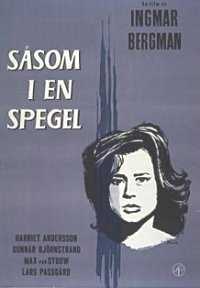
THROUGH A GLASS DARKLY
Sweden, 1961, 90 minutes, Black and white.
Harriet Andersson, Gunnar Bjornstrand, Max von Sydow, Lars Passgaard.
Directed by Ingmar Bergman.
By 1961, Ingmar Bergman had acquired a worldwide reputation for serious, often profound, film-making. He had some comedies with the light touch in the mid-1950s but then moved to The Seventh Seal and Wild Strawberries. Serious dramas followed, including the Virgin Spring, which won the Academy award for best foreign language film in 1959. Through a glass Darkly was to win the same award for 1961.
It is the first in a trilogy of very serious films about the presence and absence of God. Winter Light was to follow and The Silence completed the trilogy. Bergman was to continue making profound films for another two decades and more.
This was his first film shot on the island to Faro. It features a cast prominent in so many of his films. It takes place over 24 hours. A family is on the island, the father, Gunnar Bjornstrand, is a somewhat aloof novelist who travels. Harriet Andersson, at the centre of the film, plays his daughter, Karin, who has been in an institution and is still trying to cope with her mental condition, schizophrenic. Max von Sydow plays her husband. Her young brother, emotionally alienated from his father, Lars Passgaard, is somewhat dependent on his sister and there is a sexual encounter.
The title comes from St Paul, 1 Corinthians 13. Karin has an experience of God, seen as a spider emerging from a crack in the wall. He is penetrating, not penetrating, seen to have cold hard eyes. Nevertheless Karen says that she has seen God.
1. The impact? The first of the trilogy? The status of Ingmar Bergman films by 1961 – this film winning the Oscar?
2. The cast, Bergman’s troupe? Filming on the island of Faro? The Bach music?
3. The island settings, isolated, the terrain, the house, the sea? The interiors? The importance of the photography, light and darkness, contrasts?
4. The action taking place over 24 hours? The characters, their interactions, the exploration of psyche? The religious questions? God, the spider? The background of art, literature, exploitation? Issues of sexuality?
5. The title, the reference to St Paul and his hymn in 1 Corinthians 13?
6. The focus on Karin, her age, relationship with her father, with her brother, her period in the institution, her husband? Schizophrenia, in herself, with her husband, the situation seeming hopeless? Her father, the novelist, his observations? Minus, his age, deprivation of his father’s love, his dependence on Karin, their sexual encounter?
7. David, his age, work, travel, his writing? Minus and the play?
8. The night, Karin, Minus and the sex, the wreck of the boat? Karin and her voices, the wall, her going into David’s office, the desk, her seeing the information about her?
9. David and Minus, going fishing, talking, suicide issues, David and the discovery of love?
10. Minus, talking with Karin, his frustrations, Karin and the contrast with her hope, God, with Minus in the wreck, the effect of the sexual experience? Minus talking about the experience?
11. Karin, Confessing, the declarations about what God had told her? Being taken to the hospital?
12. Packing, the episode in the attic, the presence of God, the crack in the wall, the spider? The sound of the helicopter? Karin’s panic?
13. The impact of the God experience, her being sedated, God and the evil face, not penetrating her, withdrawing, God’s eyes as cold and calm? Karin declaring that she had seen God?
14. The impact on Martin, Karin and Martin leaving?
15. Minus, insecure, David and the discussion about God and discovering love, God sustaining Karin, Minus and the importance of his talking with his father?